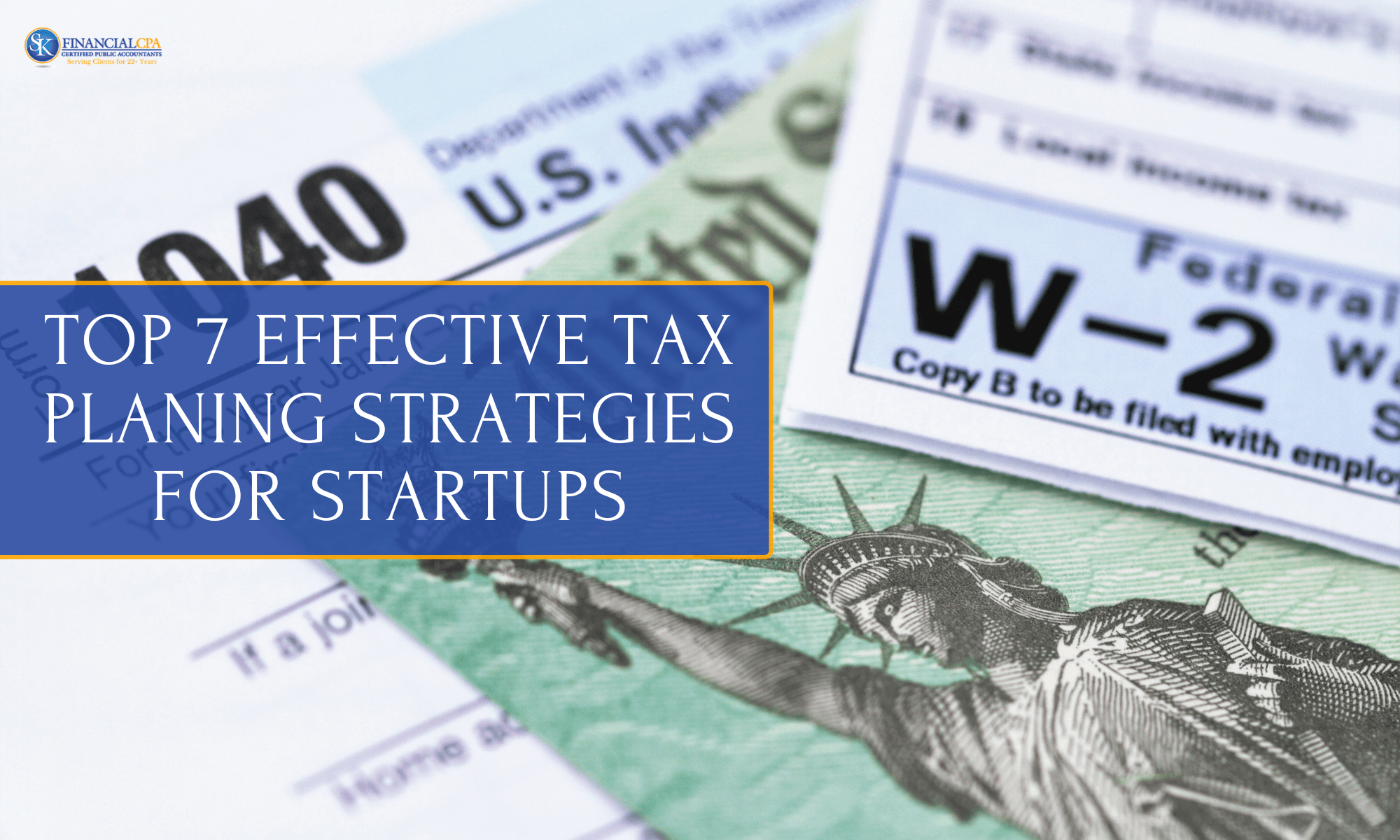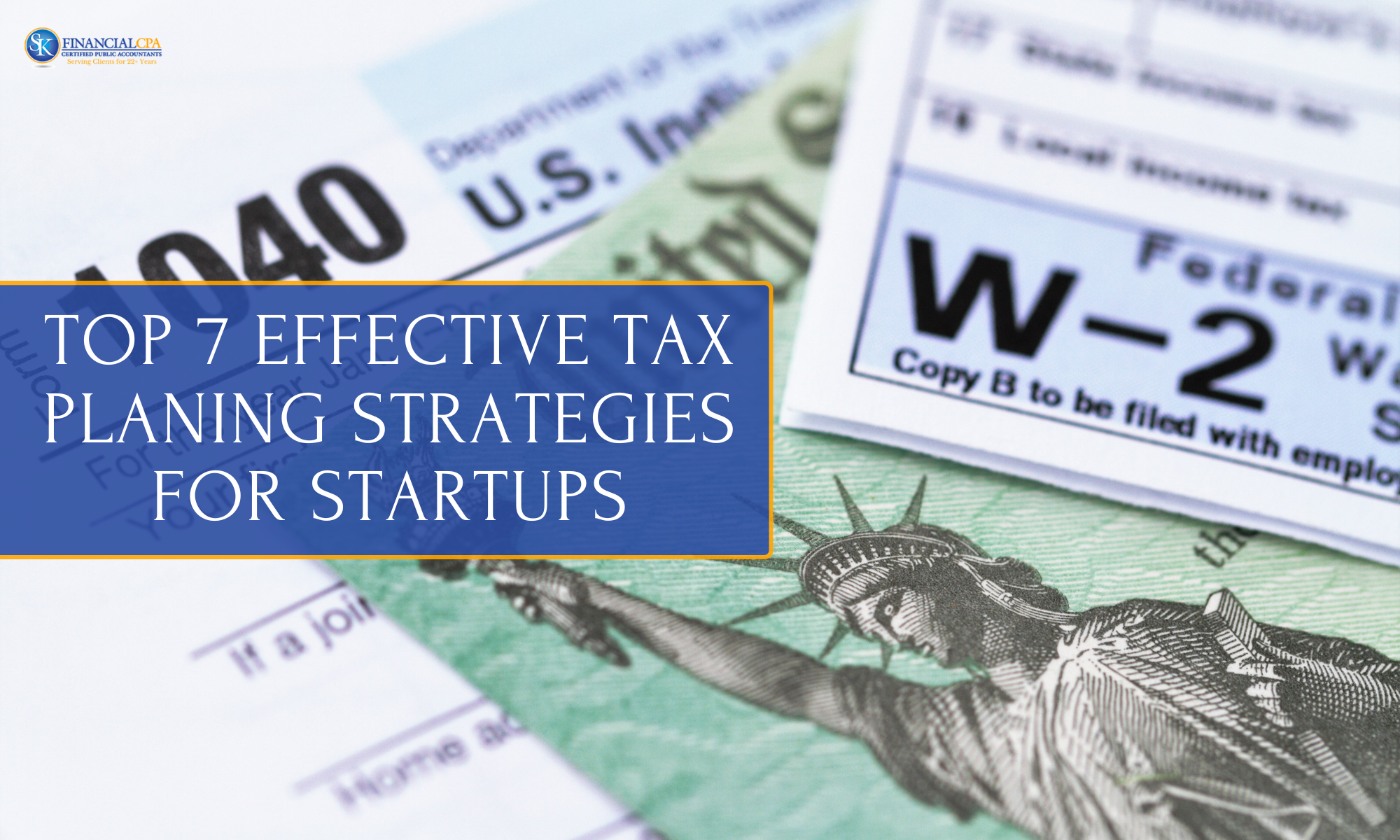
Top 7 Effective Tax planning Strategies for Startups
Effective tax planning strategies is crucial for startups, as it can significantly reduce tax liabilities while ensuring compliance with tax laws. By adopting strategic tax planning measures, startups can improve their profitability and enhance their cash flow, which is vital for growth and sustainability. This blog delves into seven key tax planning strategies that startups can use, emphasizing the importance of understanding and leveraging tax planning strategies in the USA.
Why Tax Planning strategies is Crucial from the Startups
When an entrepreneur turns an idea into a business, tax planning strategies becomes essential to financial decision-making. Early tax planning can set a startup on a path to sustainability and growth, optimizing its financial resources and ensuring compliance with tax laws.
Tax planning strategies are crucial for startups from the outset as they lay the foundation for long-term financial success. By incorporating Tax Planning Strategies for Startups early on, businesses can effectively manage their tax liabilities, maximize available deductions and credits, and optimize their overall tax structure. This proactive approach enables startups to make informed financial decisions, allocate resources efficiently, and remain compliant with tax laws and regulations. Moreover, implementing tax planning strategies from the start ensures that startups are well-positioned to navigate complex tax considerations as they grow and evolve. By prioritizing tax planning, startups can minimize tax-related risks, preserve valuable capital, and enhance their overall financial health, setting the stage for sustainable growth and profitability.
Optimal Entity Selection for Tax Planning Strategies for Startups
Selecting the optimal entity structure is a crucial tax planning strategy for startups. The entity type chosen can significantly impact the tax liabilities and benefits for the business and its owners. Common entity options include sole proprietorships, partnerships, limited liability companies (LLCs), S corporations, and C corporations. Each entity type has its own tax implications, such as pass-through taxation for sole proprietorships, partnerships, and LLCs, or double taxation for C corporations. Startups must carefully evaluate factors such as the nature of their business, the number of owners, desired liability protection, and future growth plans when choosing an entity structure. By selecting the most suitable entity type, startups can optimize their tax planning strategies, minimize tax liabilities, and maximize tax benefits for long-term financial success.
Here are several reasons why tax planning strategies is critical from the beginning
Choose the Right Business Structure for Optimal Tax Benefits
Selecting the most advantageous business structure is the cornerstone of effective tax planning. The choice—whether a sole proprietorship, partnership, limited liability company (LLC), or corporation—dictates tax obligations and can have profound implications on a startup's financial well-being.
-
Sole proprietorship and partnership structures are straightforward in establishing and offering tax benefits but might lead to higher personal income taxes. They suit small startups without significant liability concerns.
-
LLCs provide flexibility, allowing owners to choose between being taxed as a sole proprietorship/partnership or a corporation, thus avoiding double taxation while offering personal liability protection.
-
C corporations face double taxation (on profits and dividends) but can benefit from lower corporate tax rates and deductible business expenses. S-Corporations avoid double taxation by allowing profits and losses to be passed directly to shareholders' income, avoiding corporate tax.
Maximize Tax Credits and Deductions to Lower Taxable Income
Various tax credits and deductions are designed to encourage business activities, from research and development to initial startup costs, each offering opportunities to reduce taxable income.
-
The Research and Development (R&D) tax credit is specifically aimed at businesses involved in research and innovation. This credit can offset both federal and, in some cases, state taxes, providing significant savings for qualifying activities.
-
New businesses can deduct up to $5,000 in startup and $5,000 in organizational costs in their first year, covering expenses like market research and legal fees.
-
For startups operating out of a home office, this deduction allows business owners to deduct a portion of their home expenses, such as mortgage interest, insurance, and utilities, based on the percentage of their home used for business.
Implement Retirement Planning to Benefit Both Employer and Employees
Establishing retirement plans benefits employees and can provide tax planning advantages for the business, including deductions for contributions and potential tax credits.
-
401(k) Plan contributions the company makes are tax-deductible, reducing taxable income. Startups may also qualify for tax credits for setting up new plans, lowering the cost of offering retirement benefits.
-
SEP IRA plans allow for higher contribution limits than many other retirement accounts and are relatively easy to manage. They make them an attractive option for startups looking to offer retirement benefits with minimal administrative overhead.
Strategically Use Tax Loss Harvesting to Offset Capital Gains
Tax loss harvesting is a method to manage investment losses, using them to offset capital gains, which can reduce taxable income and, consequently, tax liability. Monitor and adjust portfolios regularly to review investment portfolios to identify underperforming assets that can be sold at a loss, which can then offset gains from better-performing investments, which is crucial to maximizing the benefits of tax loss harvesting.
Time Income and Expenses to Optimize Tax Outcomes
By strategically timing the recognition of income and the payment of expenses, startups can significantly influence their tax liability for a given year. Delaying the receipt of payments or invoicing until after the end of the tax year can push income into the next tax period, potentially lowering the current year's tax liability. Prepaying expenses or making significant purchases before the end of the tax year can increase deductions for the current year, thereby reducing taxable income.
Leverage Charitable Contributions as a Strategic Tax Planning Tool
Making charitable contributions supports the community and can offer tax advantages, allowing startups to reduce their taxable income through donations. Donating appreciated stock or equity can be particularly beneficial as it may enable the company to avoid capital gains tax on the increase in value, in addition to receiving a deduction for the total market value of the contribution.
Stay Informed and Seek Professional Tax Advice
Tax laws are complex and frequently change, making it vital for startups to stay informed and consult with tax professionals to navigate the intricacies of tax planning strategy effectively.
-
Keeping up-to-date with the latest tax laws and understanding their implications is crucial for effective tax planning.
-
Engage with tax professionals who can provide personalized advice tailored to the specific circumstances of the startup, ensuring compliance and optimizing tax benefits.
Tax planning strategy is a dynamic and essential component of managing a startup, requiring a thorough understanding of tax laws and strategic financial planning. By employing these seven strategies, startups can ensure compliance and significantly enhance their economic efficiency. Remember, while these strategies can provide a solid foundation, the complexity of tax laws means consulting with a tax professional is invaluable to tailoring these strategies to your startup's unique needs.
Maximize Your Tax Refunds with us
At Sk Financial, we understand the importance of effective tax planning and its impact on your financial well-being. That's why we're excited to offer various discounts designed to support startups, families, and individuals across multiple stages of life. We aim to make professional tax services accessible and rewarding for our clients, ensuring you maximize your tax strategies efficiently.
- First-Year Welcome Discount
- Community Appreciation Discounts
- Family Savings Plan
- Couple's Benefit
We're committed to providing exceptional tax services catering to your specific needs and circumstances. We hope to make our services more accessible and demonstrate our commitment to your financial success.
Retirement savings comparison between 2023 and 2024
The financial landscape constantly evolves, and adjustments to retirement savings and investment tax considerations come with each new year. Below is a comparison table highlighting critical changes from 2023 to 2024, including IRA and 401(k) contribution limits and long-term capital gains tax limits. These adjustments can have significant implications for retirement planning and investment strategies, emphasizing the importance of staying informed and adapting to these changes.
|
Category |
2023 |
2024 |
|
IRA Contribution Limit (Under 50) |
$6,500 |
$7,000 |
|
IRA Contribution Limit (50 and over) |
$7,500 |
$8,000 |
|
401(k) Contribution Limit (Under 50) |
$22,500 |
$23,000 |
|
401(k) Contribution Limit (50 and over) |
$30,000 |
$30,500 |
|
Long-term Capital Gains 0% Limit (Single) |
$44,625 |
$47,025 |
|
Long-term Capital Gains 0% Limit (Joint) |
$89,250 |
$94,050 |
|
Long-term Capital Gains 15% Limit (Single) |
$44,625 to $492,300 |
$47,026 to $518,900 |
|
Long-term Capital Gains 15% Limit (Joint) |
$89,250 to $553,850 |
$583,750 |
|
Long-term Capital Gains 20% Limit (Single) |
Above $492,300 |
Above $518,900 |
|
Long-term Capital Gains 20% Limit (Joint) |
Above $553,850 |
Above $583,750 |
FAQs
Q1: How does choosing the proper business structure affect a startup's tax planning?
A1: The choice of business structure significantly impacts a startup's tax obligations and opportunities for savings. Different structures, like sole proprietorships, partnerships, LLCs, and corporations, have unique tax treatments. Selecting the proper structure can minimize tax liabilities, provide flexibility in profit distribution, and affect personal liability. It's a foundational decision that influences how much tax a startup pays and its overall financial strategy.
Q2: What benefits do tax credits and deductions offer startups?
A2: Tax credits and deductions can substantially reduce a startup's tax bill. Credits directly reduce the amount of tax owed, dollar for dollar, while deductions lower taxable income. Startups can take advantage of specific credits for research and development, energy efficiency, and the employment of particular populations. Deductions include startup costs, office expenses, and employee benefits. Utilizing these benefits can improve a startup's cash flow and reinvestment capacity.
Q3: Why is strategic timing of income and expenses necessary in tax planning?
A3: Strategic timing of income and expenses allows startups to manage their tax liability more effectively. By deferring income to the next fiscal year and accelerating expenses into the current year, startups can lower their taxable income and, consequently, their tax due in a given year. This timing can improve cash flow in the short term and provide more resources for investment and growth.
Q4: How can implementing retirement plans benefit a startup from a tax perspective?
A4: Implementing retirement plans offers tax benefits for the startup and its employees. For the startup, contributions to employee retirement plans are typically tax-deductible, reducing the company's taxable income. Moreover, offering retirement benefits can qualify startups for tax credits, lowering their tax burden. For employees, these plans provide a tax-advantaged way to save for retirement, enhancing the overall benefits package and potentially aiding in talent recruitment and retention.
Q5: Why is professional tax advice crucial for startups?
A5: Professional tax advice is crucial for startups due to the complexity of tax laws and the potential for significant financial implications. Tax professionals can offer tailored advice that aligns with the startup's business model, growth plans, and specific financial situation. They can help identify applicable tax credits and deductions, advise on the optimal business structure, and ensure compliance with changing tax regulations. Professional guidance can prevent costly mistakes and optimize a startup's tax strategy for long-term success.
Follow SKFinancial on Facebook / Twitter / Linkedin / Youtube for updates.









